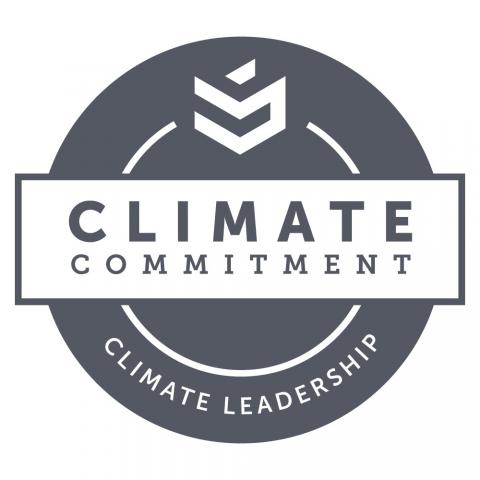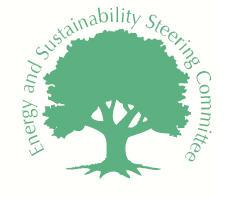Gourmet Dining is Rider’s new food service provider, starting in the summer of 2018. Check back for more information about Gourmet’s sustainability initiatives soon.
C & W Services provides janitorial services to schools, offices, laboratories and more. Their 12,000 employees are trained in green cleaning practices. The GreenClean program utilizes cleaning products, tools, and training to create sustainable and healthy environments in educational, commercial and other public buildings. C &W recycling and waste management initiatives help increase recycling ratios and reduce landfill waste, minimizing environmental impacts and waste disposal costs. Rider University uses C&W janitorial services on both the Lawrenceville and Princeton campuses. Learn more about C&W’s green cleaning methods here.
Waste Management defines environmental performance as consuming less, emitting less, and achieving financial objectives. Consuming less is practiced by using less water, energy, and natural resources in their facilities. Emitting less is exemplified by lowering emissions from their vehicle fleets and buildings. To address these goals and ensure responsibility for each issue, waste management has developed the following teams: Environmental Protection, Groundwater Protection, Environmental Engineering, Air/Gas Management, and National Laboratory Services. A variety of systems and training opportunities are provided to track environmental responsibility and give employees proper understanding. To advance environmental practices, WM has created Think Green to develop renewable energy from trash and recycling. Waste Management serves the Rider Lawrenceville and Princeton campuses for their trash and recycling disposal needs. Learn more about Waste Management’s sustainability policies here.
Waste Oil Recyclers is a business located in Pennsylvania that provides proper disposal of waste oil from restaurants, schools, and other food service facilities. Oil is collected from facilities and turned into a biodiesel fuel for uses such as powering homes and running “grease” cars. By repurposing waste oil into the creation of biodiesel, the need for petroleum is eliminated. Rider’s food service provider assists in the collection of waste oil, which is then picked up by Waste Oil Recyclers. Their 5,000 square foot plant is used to convert the oil into fuel which is then sold. Both campuses, Lawrenceville and Princeton, are pick-up locations for Waste Oil Recyclers.
Sustainable Lawrence is a volunteer group of residents, businesses, congregations, and organizations in Lawrence committed to instilling sustainable practices in their community. They define a sustainable community as “a community in which the present needs of all of its citizens are met without compromising the ability of future generations to meet their needs.” Sustainable Lawrence encourages residents to adopt sustainable practices in their everyday lives to decrease dependency on fossil fuels and harmful chemicals, minimize the intrusion of wildlife, and live efficiently. One method they’ve adopted to encourage involvement, is by developing task forces to approach each issue individually. In addition, various recycling opportunities, workshops, and sustainable tips are offered to residents. Rider University is a Sustainable Lawrence partner. Check out the website here.
Sustainable Jersey is a program offered to municipalities in New Jersey, giving them the opportunity to become a certified Sustainable Jersey town. The organization suggests programs that municipalities can implement to become certified. Tools and guidance offered through Sustainable Jersey give simple solutions to take a step in the environmental direction. In addition, they provide opportunities for grants and fundraising options for funding sustainable projects and initiatives. Other offers presented to municipalities include events and trainings. In order for a municipality to become certified, they must complete a list of point awarded items including: creating a green team, hosting training programs, taking a carbon footprint of your township, etc. Rider University is a member of a Sustainable Jersey community. See the website here.
Second Nature In 2007, Rider’s President signed the President’s Climate Commitment with a goal to make Rider carbon neutral by 2050. Known then as the American College and University Presidents’ Climate Commitment (ACUPCC), this collaborative was developed in 2007 to encourage colleges across the country to adopt more sustainable efforts. The ACUPCC has since been renamed to the President’s Climate Commitment, and institutions have signed in agreement to: complete an emissions inventory, set a target date for becoming carbon neutral, take immediate steps to reduce emissions, integrate sustainability into the curriculum, and make the plan of action public. The organization ensures that institutions have the opportunities and resources available to accept the commitment of becoming carbon neutral. Rider University adopted a Carbon Neutrality Plan and continues to update Second Nature on their efforts. See Rider’s Greenhouse Gas Emissions Inventory and commitment progress by clicking here.
AASHE (Association for the Advancement of Sustainability in Higher Education) defines sustainability in an inclusive way, encompassing human and ecological health, social justice, secure livelihoods, and a better world for all generations. AASHE is an association of colleges and universities in the U.S. and Canada working to create a sustainable future. It was founded in 2006 with a mission to promote sustainability in all sectors of higher education - from governance and operations to curriculum and outreach - through education, communication, research and professional development. Rider University is an AASHE partner member
SCUP (Society for College and University Planning) aims to help higher education institutions plan for success in a variety of areas, one of which being sustainability. SCUP partners with AASHE and HEASC (Higher Education Associations Sustainability Consortium ) to develop strategic plans for partner institutions to efficiently adopt sustainable practices. In addition, SCUP supports HESA (Higher Education Sustainability Act) and Carbonfund.org, and provides professional development programming on sustainability. SCUP conferences have not only provides means for members to be more sustainable, but have taken sustainable measures themselves with less paper promotional waste and holding conference in a sustainable city. Rider University is a SCUP member.
AICUNJ (Association of Independent Colleges and Universities in New Jersey) is an organization connecting independent higher education in the state to further advance their success.
#OurTomorrow is a collaborative celebration of the profound power of young people to make change through service and civic engagement, aiming to build a nationwide community of engaged citizens; to inspire students to take action; and to show that engagement matters. #OurTomorrow is nonpartisan and inclusive of diverse perspectives. Launched as a social campaign in January 2017 and brought together students, faculty, staff and community members to share how they were making a difference for #OurTomorrow across all social media platforms, Rider has participated since its inception. In addition to the collaborative social media campaign, #OurTomorrow fosters a professional networking group and monthly Learning Series where partner institutions share knowledge, resources and approaches to advance service and civic engagement in higher education.
Community Recycling is a textile recycling company based out of Fairless Hills, PA. Rider first partnered with Community Recycling in 2013 and placed permanent collection bins on campus, outside Beckett Village and Gee Hall. Additionally, the clothing and accessories collected from residence halls during the annual “Don’t Trash it, Recycle It” are sent to be kept from the landfill. CR Campus is an innovative recycling solution that makes moving out from campus dorms and apartments more sustainable, while providing funding that continues to support the programs of the Office of Sustainability and delivering a global impact.
Climate Central is an independent organization of leading scientists and journalists researching and reporting the facts about our changing climate and its impact on the American public. This organization’s scientists publish and the journalists report on climate science, energy, sea level rise, wildfires, drought, and related topics. Climate Central is not an advocacy organization but a sustainability news provider to increase and improve awareness of environmental issues through research, media, and communication.
Sierra Club is a national, member-supported environmental organization, which seeks to influence public policy in both Washington and the state capitals through public education and grass-roots political action. The Sierra Club has about 20,000 dedicated members, the New Jersey chapter being the 10th largest in the United States.
Powershift is a grassroots-driven community looking to empower and serve as a hub for the youth climate movement. Over 100,000 students gather at Power Shift to build a strong and vibrant movement against issues such as fracking, divesting from fossil fuels, demanding climate justice and building a clean energy economy. The Rider Eco-Reps have attended two Power Shifts in the past.
Community Assistants are undergraduates who are responsible for a number of students that live in residence halls and on campus. He/she assists in the social, educational, cultural and community development of students in the residence halls and Greek houses. The CA/CD serves as a communicator, listener, and initiator of activities, resource person, limit-setter, administrator and friend. Eco-Reps work with Community Assistants and Community Directors to spread awareness about sustainability on campus to residents.



